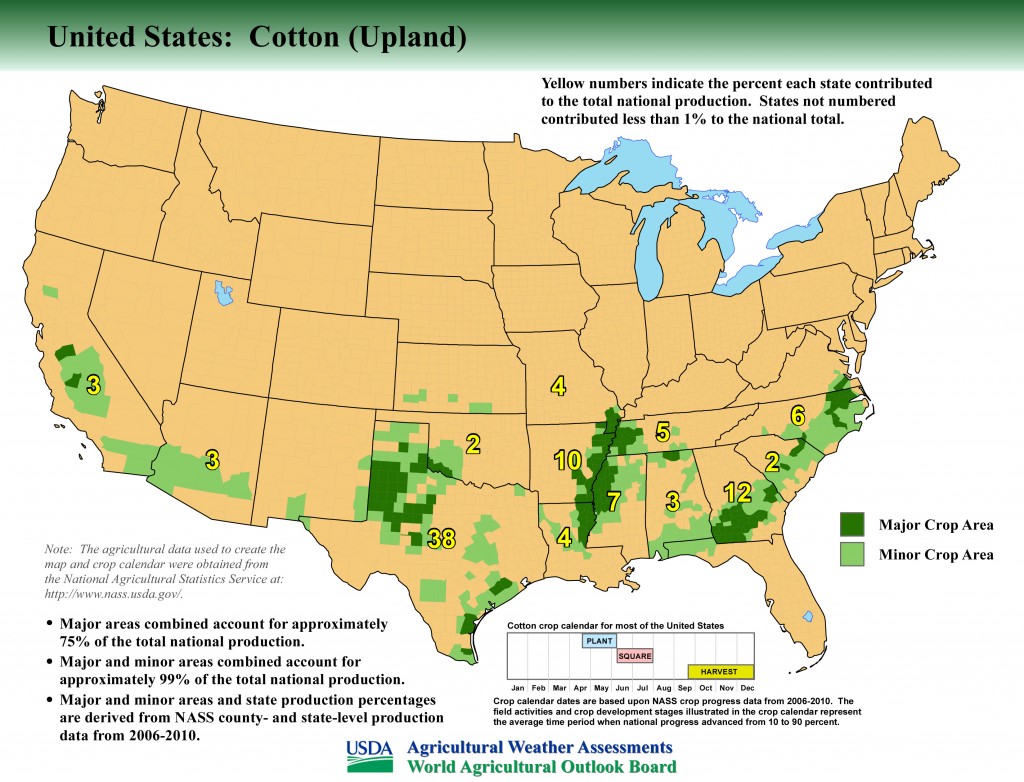"The present Government of the United States is not an abolitionist government…. But though not an Abolitionist party, they are a Free-soil party. If they have not taken arms against slavery, they have against its extension. And they know, as we may know if we please, that this amounts to the same thing. The day when slavery can no longer extend itself, is the day of its doom. The slave-owners know this, and it is the cause of their fury…."
I see this claim over and over in discussions on the Civil War. I see it always alleged that if slavery couldn't expand, it would perish. I used to believe this claim. I stopped believing it a couple of years ago when I actually looked at the evidence.
The primary industry of slavery was agriculture, specifically crops like Cotton, Tobacco and Indigo. I wondered to myself if cotton would even grow in the territories. I decided to look up a modern map of cotton producing states.

Other people who were knowlegable on the subject informed me that the Cotton shown growing in West Texas, New Mexico, Arizona and Southern California can only be grown as a consequence of modern irrigation systems which wouldn't have been possible in the 19th century. So what does that leave? Apart from a tiny bit in Kansas, it leaves exactly the same area in which Cotton was already grown.
Wait! You mean slavery *COULDN'T* expand into the territories because it was physically impossible? Well what about all these people saying it can't be allowed to expand? The true barrier to the expansion of slavery was the agricultural reality of the territories, not laws passed by men.
According to this Wikipedia article, "Regardless of its official status, slavery was rare in antebellum New Mexico. Black slaves never numbered more than about a dozen"
And this was during the time "New Mexico Territory" looked like this:

So we've been misled. For some reason a lot of people have been lying about the danger of slavery expanding into the territories. Since slavery couldn't possibly expand into them to any significant degree, what then was their motivation for putting forth this claim?
Well what is different? If you have a state into which slavery cannot expand in actuality, but in which slavery is legal there, what does this affect? Does it not affect the voting blocks in Congress?
The Northern States, Led by New York, had managed to obtain a significant majority in Congress, and as a result could set the tariff's high, (73-85% paid for by the Southern State export industry) and they had jiggered the laws to make certain almost all the import traffic came into New York. New York had all the slave produced income funneling through the hands of their major citizens, and they were extracting about 40% of the total revenues from all slave production in the South.
Washington DC was collecting it's taxes in the port of New York, and so they were getting a good 20-40% right off the bat from goods imported to the US in exchange for Southern exports. Both New York and Washington DC were making a whole lot of money on the existing status quo.

What would happen if "slave" states were added to the Union? That majority they had in Congress would be diminished, and this cushy system they had rigged up which resulted in money funneling through their hands might be endangered.
I now believe they spread the claim that slavery needed to expand to keep it from perishing because the status quo was making them money, and if any states were admitted that would vote with the Southern states, their money funneling system would fail.
I note John Stuart Mill mentions the "Free Soil Party."
Funny thing about the "Free Soil Party." It's headquarters were in New York city, rather than Topeka Kansas. For some reason big city folk in New York decided to concern themselves with the doings 1,000 miles away in Kansas and other territories.
Now why would New Yorkers want to worry about "Free Soil" in Kansas, Nebraska, etc.? You might think it is as a consequence of the milk of human kindness, but it coincidentally keeps the US Congressional representation favoring what is best for the Robber Baron elite of New York city.
Odd coincidence.